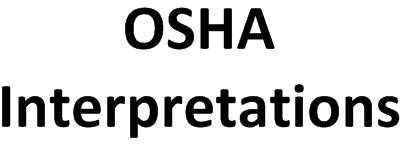 The purpose of this memorandum is to resolve issues concerning adjustments of the PEL during extended work shifts. This applies for exposures to the noise levels of Table G-16 of 29 CFR 1910.95 or substances found in Subpart Z. Current OSHA policy requires only the action level to be reduced for exposures to noise during extended work shifts; the PEL is not required to be adjusted. The only standards which require PEL adjustments are the lead standards in construction and general industry. These standards have a specific provision which requires work shift adjustments. Existing policy for Occupational Exposure to Cotton Dust also has a requirement to adjust extended work shifts when employees are required to wear respirators for a portion of the work shift to reduce their level of exposure, as set forth in the Federal Register, Vol. 45, No. 251, pp. 85736-85739. The contribution that the extended work hours adds to employee exposure must be included in calculating the required time respirators must be worn during the shift.
The purpose of this memorandum is to resolve issues concerning adjustments of the PEL during extended work shifts. This applies for exposures to the noise levels of Table G-16 of 29 CFR 1910.95 or substances found in Subpart Z. Current OSHA policy requires only the action level to be reduced for exposures to noise during extended work shifts; the PEL is not required to be adjusted. The only standards which require PEL adjustments are the lead standards in construction and general industry. These standards have a specific provision which requires work shift adjustments. Existing policy for Occupational Exposure to Cotton Dust also has a requirement to adjust extended work shifts when employees are required to wear respirators for a portion of the work shift to reduce their level of exposure, as set forth in the Federal Register, Vol. 45, No. 251, pp. 85736-85739. The contribution that the extended work hours adds to employee exposure must be included in calculating the required time respirators must be worn during the shift.
As stated in a previous memorandum dated November 8, 1996:
Compliance officers can choose one of two approaches for employees who work extended work shifts beyond 8 hours. The choice taken will depend on the nature of the hazardous chemical.
- The first approach is to sample what the compliance officer believes to be the worst continuous 8-hour work period of the entire extended work shift.
- The second approach is to collect multiple samples over the entire work shift. Sampling is done such that multiple personal samples are collected during the first 8-hour work period and additional samples are collected for the extended work shift. Unless a compliance officer is dealing with lead, the PEL in this approach is calculated based upon the worst 8 hours of exposure during the entire work shift.
We hope you find this clarification helpful. If you have any questions or if we can be of any further assistance, please contact the Office of Health Enforcement at (202) 693-2190.
A link to the memo can be found HERE
